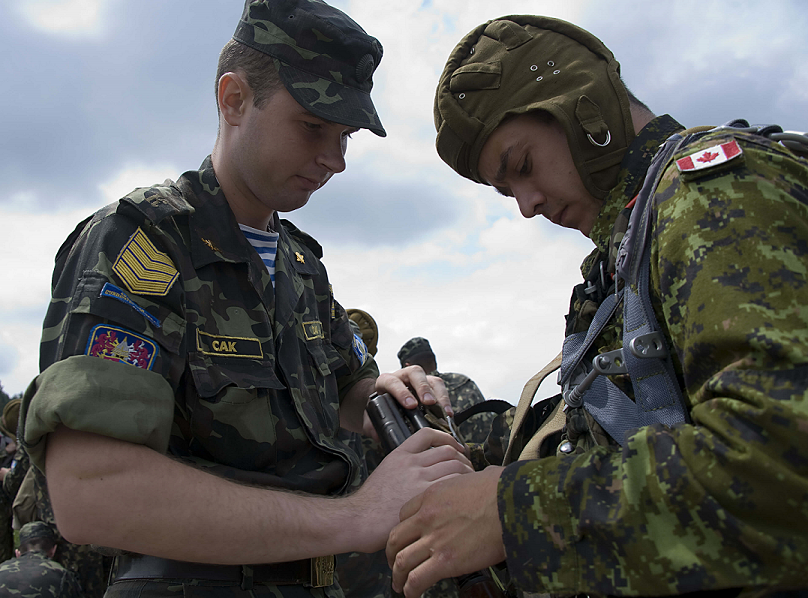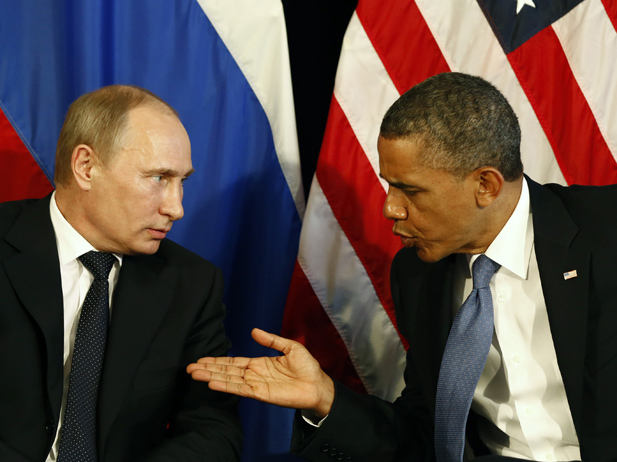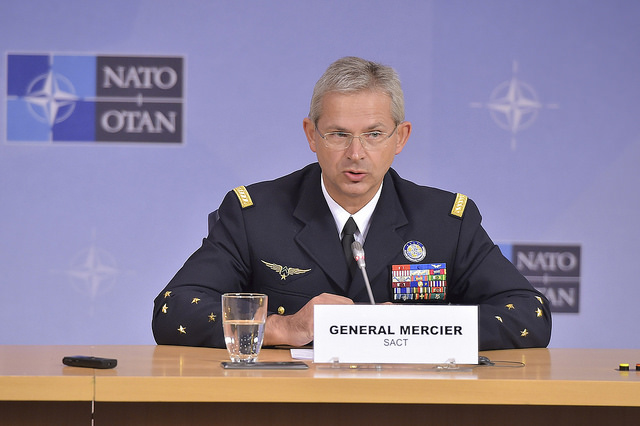As the conflict in the eastern part of Ukraine continues to escalate, the 2015 surge in the deployment of the Canadian Armed Forces (CAF) to Eastern Europe is intended to demonstrate Canada’s commitment to NATO’s principles of pre-emptive and collective defence. This doctrine stretches across all three spectrums of the CAF: the rotating deployments of HMCS Fredericton, Regina and Toronto to the Black Sea to bolster NATO maritime standing presence; the contribution of a battalion of the Royal Canadian Regiment to Poland for NATO military exercise SARMIS with the US, Romanian and British forces; and the sessional deployment of six CF-18 aircraft and 200 support staff to Romania for training exercises. In addition, 200 CAF members will be sent to Yavoriv, Ukraine, to lead non-combat and training operations. This large scale, politically sensitive and costly operation may be seen as a provocation by Russia, but in my opinion is vitally important to Canada’s presence on the world stage.
The regional unrest has not yet resulted in any serious incursions into NATO signatory members. Suspected Russian involvement in the form of military infiltration has raised fears in NATO countries such as Romania, Poland and Lithuania that the unrest may be reaching critical mass, and will soon encroach on their own borders. These fears are heightened by their troubled history with Russia’s precursor, the Soviet Union, a concern that Russian President Vladimir Putin has done little to reduce with aggressive rhetoric towards the EU and former Soviet satellites.
In the event of a hostile attack on a NATO member, Canada would be obliged to deploy military assistance as per Article 5 of the 1949 NATO Treaty, which states that “an armed attack against one or more of them in Europe or North America shall be considered an attack against them all.” While no such direct attack has been made, regional unrest in Eastern Europe has historically proven salient: the breakup of Yugoslavia and its subsequent decades of war show that the interconnectivity of ethnic, religious and national conflicts can quickly embroil surrounding countries. By deploying forces to the area as a pre-emptive security and reassurance tactic, Canada is fulfilling its NATO obligations to Article 4, which demands consultation whenever “the territorial integrity, political independence or security of any of the parties is threatened’. This strategy puts mechanisms in place to reinforce Article 5 and the defence of a NATO nation from any threat vector.
The Can $16 million price tag should be viewed as a long-term investment to ensure our diplomatic commitments, and prove to Canada’s allies its willingness to put boots and materiel on the ground in the face of threats to NATO members. Furthermore, the deployment of CAF members in Ukraine is still, at this point, very low risk. Yavoriv is located in western Ukraine, next to the Polish border at the opposite end of Donetsk and the current frontline. Should the situation change, a reappraisal of Operation REASSURANCE’s mandate would be necessarily prudent.
Canadians today should take a moment and deeply examine how we want to be perceived in the present and remembered in the future. This country has a legacy that has actively contributed to world peace, first through allied efforts in the world wars, and then with continued and dedicated involvement with international organizations such as the UN and NATO. Appropriately, it was Canada’s 14th Prime Minister, Lester B. Pearson, who helped lay the 1957 diplomatic foundations for future multinational UN peacekeeping missions. This is not to intrinsically or morally compare UN mandates with Canada’s NATO participation in Eastern Europe, but in recent history, NATO stepped up and filled a void that the UN was unable to do because of political indecision, such as Kosovo in 1989-1999. Canada’s involvement in Eastern Europe is primarily concerned with humanitarian and regional stability goals, a worthy continuation of the country’s peacekeeping history.
Furthermore, as a multicultural nation, Canada boasts a citizen membership drawn from a global base; the over 1.2 million citizens who identify as Ukrainian descent represent a significant element of Canada’s cultural mosaic. They have been a vocal element contributing to the near constant support that the Canadian government has offered Kiev since the crisis began in late 2013. As a democratic nation, is Canada not obligated to pay attention to the needs and desires of a large and long-standing element of its citizenry?
This is not to say that problems do not exist with Operation REASSURANCE and Canada’s role within it. Underfunded and divided by the civil war, the Ukrainian Army and National Guard has been forced to rely on roughly 70 ad-hoc militias, a few of which hold troubling right-wing or fascist ideologies. The issue of donated CAF equipment falling into their hands is a sensitive one. For instance, in June 2015, the US House of Representatives passed a rare non-partisan bill banning the issue of weaponry to one of the more notorious militias, the Azov Battalion, and the NDP are pressing the Conservative government to pass a similar bill in the Canadian Parliament. Ultimately, however, these units do not represent the majority of Ukrainian’s fighting for their sovereignty, and should not overly influence Canadian and NATO policy. Since Canada’s presence as a founding member of NATO in 1949, Canadian soldiers have taken part in every major NATO military deployment across the globe; let’s not look back on Ukraine as the one we decided to sit out.






